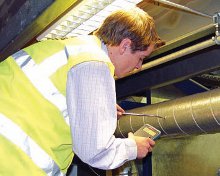An inspector calls
23 February 2013Regular LEV testing ensures a system is operating efficiently. Steve Powney reports
Regular testing of extraction systems is not only a statutory duty to ensure health and safety of workers but also ensures their efficient operation.
Bath-based Western Air Ducts (WAD), which designs, manufactures and installs local exhaust ventilation (LEV) systems, is trying to raise awareness of the need for regular testing.
It has set up a separate division and website - www.wadlev.co.uk - to offer a full Control of Substances Hazardous to Health (COSHH) LEV testing and inspection service for furniture and joinery manufacturers throughout the UK.
The family-run business, established in 1973, services a wide range of clients nationally.
"Over the last few years there has been more demand for systems to be regularly inspected," said operations director Scott Lintern.
He said there were thousands of pieces of woodworking dust extraction equipment around the UK, but some people still did not realise inspections were needed and ended up falling foul of the regulation. Most LEV systems require a statutory rest every 14 months.
"If you're using a system you rarely see its performance drop off quickly," added Mr Lintern. "It's more of a gradual slowdown so you might not notice. If the performance drops off, then the speed drops and the extraction will be heavier causing more product to drop off.
"The ductwork is designed to be clear in extraction but if the performance drops it can no longer carry that waste in suspension."
An inspection for a smaller extraction filter unit system serving a one- or two-man joinery workshop running a planer, saw and spindle moulder would be about £150-200, though cost goes up for larger installations.
"If the filter unit has failed there is dust on both sides of the filter unit. I've also seen doors hanging off and bins that are not emptied. Forgetting to empty the bin is a common occurrence. Tell-tale signs of this include a system not working very well. If the system is quite powerful there will still be some suction but it won't be picking up many dust particles. Repairs are often needed.
"Sometimes it's difficult to tell clients because it's a cost, but it will save them a lot of money in the long run."
Mr Lintern said he has had some awkward situations where the workshop owner is confident in the performance of his extraction equipment but his workers don't think it is operating correctly.
"At times I've had to agree with the machine operators," he said. "Rather than being oppressive and saying they've failed, we work with them to make them understand what the system is capable of. It might be they need to install some technology, such as volume control dampers to bring it up to standard.
"Rather than condemning the whole installation and telling them to buy a new system, we have a duty to our clients and the HSE to achieve a balance between being forceful and being helpful. We don't have a puritanical approach."
WAD can keep an electronic copy of inspection reports for a minimum of five years, as specified by the COSHH regulations, which can be accessed by clients at any time.
